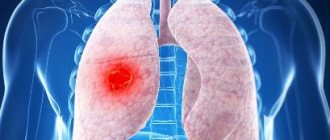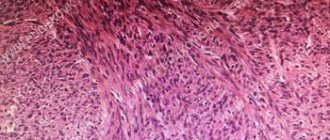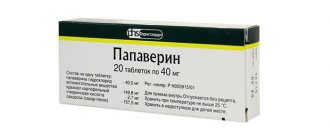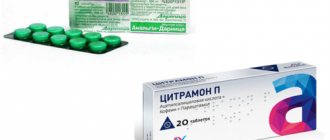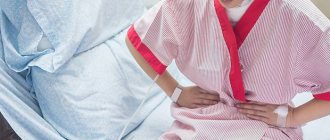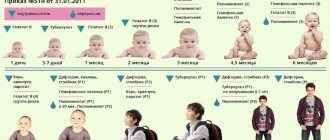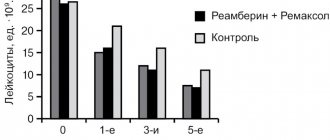Side effects often develop after chemotherapy. The most common side effects of chemotherapy are nausea and vomiting.
The Yusupov Hospital provides patients with effective care aimed at full recovery, as well as achieving tangible positive changes in people suffering from cancer. The hospital uses innovative treatment regimens in accordance with international standards. And antiemetic drugs during chemotherapy will help reduce sensitivity and susceptibility.
Complications from the digestive system
The most common complications of the digestive system during drug therapy include:
- Nausea and vomiting
- Loose stools (diarrhea)
- Stomatitis
Nausea and vomiting are the leading complaints among patients. The cause of nausea and vomiting is still not completely clear. Chemotherapy is known to cause nausea and vomiting by releasing emetogenic compounds such as dopamine, serotonin and substance P, which act on receptors in the digestive system and central nervous system, triggering the gag reflex. In other words, the development of nausea and vomiting is associated with irritation of receptors in the stomach and brain.
Who is more susceptible
Nausea is predominantly a female condition, but no explanation has been found for this; perhaps hormones are to blame, because women accumulate a lot of experience of nausea throughout their lives.
It has been noticed that people with creative professions, intellectuals and well-educated people have a harder time with antitumor treatment; it is not for nothing that it is believed that “grief comes from the mind.”
Nausea is associated with the emetogenic potential of the cytostatic drug, but is always individual in its emotional coloring and severity of symptoms. Each patient reacts differently to the same chemotherapy drug.
Types of nausea and vomiting
The type of nausea and vomiting is determined by the time it occurs during the chemotherapy cycle:
acute - on the first day after the administration of cytostatics
delayed - within 2-5 days after the administration of cytostatics.
With subsequent administrations of the drug, “premature vomiting” (nausea and vomiting “waiting”) may occur - within several hours before the administration of cytostatics. It usually develops in patients who previously received highly emetogenic PCT regimens and suffered from its complications. It can be provoked by smells, tastes, the sight of objects and surroundings reminiscent of treatment. To prevent such nausea and vomiting, tranquilizers, psychotraining, and hypnosis are used.
Unfortunately, often patients may not report the development of complications. This behavior is due to widespread misconceptions about the chemotherapy process, such as:
- “Nausea and vomiting always accompany chemotherapy”
- “The presence of nausea and vomiting indicates the effectiveness of chemotherapy”
- “My chemotherapy will be canceled!”
- “There are no effective treatments for nausea and vomiting”
Some patients downplay the strength and significance of developing complications and do not want to further disturb the medical staff. This behavior greatly impedes constructive interaction between patient and doctor and creates additional health risks.
Consequences of chemotherapy
Chemotherapy is the treatment of malignant tumors with large doses of toxic drugs that act on all actively dividing and growing cells. Chemotherapy blocks the reproduction and causes the death of such cells. However, not only tumors grow rapidly, but also bone marrow tissue, mucous membranes of the gastrointestinal tract, epithelium of the skin, hair and nails, and germ cells.
The following side effects of chemotherapy are caused by harmful effects on these tissues:
- hair loss;
- nausea, vomiting;
- anemia;
- fragility and brittleness of nails;
- dry skin;
- Temporary or permanent infertility
- constipation and diarrhea;
- ulcers on the oral mucosa;
- bleeding disorders;
- decreased immunity;
- urinary disorders;
- swelling.
Cells damaged by chemotherapy are restored some time after the end of the course. The duration of recovery depends on the condition of the body, cell resistance and the type of drug the patient received.
Side effects disappear after the end of the course of treatment, but some consequences after chemotherapy may bother the patient for several years if the drugs have damaged the heart, lungs, kidneys and, in particular, reproductive organs.
The main thing is that the patient must remember and be fully aware that, despite the side effects, chemotherapy drugs can save a person’s life and cure a malignant tumor. You can protect yourself from some side effects (for example, infertility), and the alternative to such treatment is only a slow death from cancer.
You should definitely consult your doctor in advance about the side effects and consequences of a particular group of medications. If side effects occur, the doctor will prescribe medications that can alleviate their symptoms. In extreme cases, the doctor can change the treatment regimen and replace some chemotherapy drugs with others.
The effect on reproductive function largely depends on the gender of the patient. Previous generations of drugs caused infertility in both sexes, regardless of whether the treatment was male or female. Modern drugs are more likely to cause infertility in men than in women. However, only in seventy percent of cases do young girls become pregnant after a course of chemotherapy without the help of fertility specialists.
Risk factors for developing nausea and vomiting
There are various causes that predispose to nausea and vomiting. First of all, these are the characteristics of the drug used or their combination.
The individual characteristics of the patient are of great importance:
- Age under 50
- Female
- Tendency to motion sickness in transport
- Presence of morning sickness during pregnancy
- Having had nausea and vomiting during a previous chemotherapy cycle
- Rare alcohol consumption
Chemotherapy is most difficult for women and patients under 30 years of age.
Consequences of chemotherapy for men
Chemotherapy drugs affect the male gonads, reduce the number of sperm and impair their motility. In addition, the drugs affect the hereditary material of the cell, causing changes in the DNA structure and mutations. Drugs such as cyclophosphamide and cisplatin are especially dangerous.
A course of chemotherapy causes temporary infertility in ninety percent of men. In sixty percent of them, reproductive function is not restored. And with each course, the quality of sperm will deteriorate even more, so men should think about cryopreservation of seminal fluid in advance. Then, after being cured of cancer, the patient will have the opportunity to have children.
Frozen sperm can be used at any time; it is stored for at least twenty years, and children born from it are no different from those conceived naturally.
Another problem for a man with cancer is that his body is severely depleted by the effects of the tumor and chemotherapy drugs. Often there is a decrease in libido and erectile dysfunction, but most often this problem is purely psychological. The support of a caring “other half” will help overcome this problem, especially since after completing the course, erection and libido are restored.
However, it is worth remembering that during the course a man must use condoms, even if his sexual partner uses other methods of contraception. This is due to the fact that chemotherapy drugs are even contained in a man’s seminal fluid. In addition, during the course there is a very high probability of conceiving a child with deformities.
Efficacy of antiemetic therapy
Treating complications of chemotherapy, such as nausea and vomiting, can be beneficial. The arsenal of drugs that provide the prevention and treatment of nausea and vomiting is very large. Their combined use can prevent the appearance of these symptoms in 90% of cases.
Full control: no vomiting after administration of antiemetic drugs,
mild nausea
Partial control: one episode of vomiting or mild nausea
Where to go for nausea after chemotherapy?
If after chemotherapy you feel nausea or vomiting, call Yusupov Hospital immediately. The coordinating doctor will make an appointment for you with a chemotherapy specialist and answer all your questions. He will tell you which antiemetic drugs are best to choose for chemotherapy.
Doctors at the Yusupov Hospital rely on the latest advances in the treatment of cancer. We take care of patients with complications from chemotherapy and effectively restore lost functions of the digestive system.
Lifestyle and nutrition during chemotherapy
Lifestyle and nutrition are of great importance during chemotherapy. Physical activity, fresh air, and breathing exercises are recommended. Physical activity helps to avoid complications.
It is necessary to eat properly - hunger increases nausea. Eating should begin before hunger appears, and you should eat slowly and in small portions.
Other recommendations:
- Avoid eating foods with strong odors
- Avoid fried, fatty and sweet foods
- Food should be at room temperature or chilled
- It is necessary to drink enough liquid, but not during meals
- Try not to cook your own food
- Light, quickly digestible foods are recommended: boiled potatoes, yoghurt, chicken, boiled beef, low-fat broths, rice or oatmeal, crackers.
High fiber foods
| Products | Fiber content per 100 grams, g |
| Vegetables | |
| Pumpkin | 8 |
| Avocado | 8 |
| Eggplant | 5 |
| Tomatoes | 4 |
| Beet | 3 |
| Broccoli | 3 |
| Onion | 3 |
| Greenery | 2,6 |
| White cabbage | 2,5 |
| Carrot | 2,4 |
| Fruits and berries | |
| Apricots | 10,8 |
| Blackberry | 8 |
| Raspberries | 6 |
| Pears | 4,3 |
| Apples | 4,0 |
| Currant | 3 |
| Peaches | 3 |
| Tangerines | 2,7 |
| Kiwi | 2,5 |
| Nuts | |
| Chia seeds | 38 |
| Flax-seed | 27 |
| Almond | 15 |
| Pistachios | 10,3 |
| Sunflower seeds | 10 |
| Hazelnut | 9,4 |
| Sesame | 9,1 |
| Peanut | 8 |
| Walnut | 7,5 |
| Legumes | |
| Split peas (fresh) | 18 |
| Beans | 17,3 |
| Lentils | 15 |
| Chickpeas | 13,6 |
| Green peas | 12,3 |
| Beans | 7 |
| Mash | 5 |
| Cereals | |
| Bran | 44 |
| Sprouted wheat | 17 |
| Pearl barley | 13 |
| Buckwheat | 12 |
| Whole wheat bread | 8,5 |
| Barley | 8 |
| Brown rice | 5,5 |
| Oatmeal | 2,8 |
| White rice | 2 |
| Dried fruits | |
| Figs (dried) | 9,8 |
| Raisin | 9,6 |
| Prunes | 9 |
| Dried apricots | 7,3 |
| Dates | 6 |
The fiber content is significantly reduced during technological (flour production, rice cleaning) and culinary (stewing, boiling) processing of products.
If diarrhea develops, you should choose low-fiber foods. For example, a classic nutritional recommendation during diarrhea is the use of rice water, which not only fixes loose stools, but also, by enveloping the walls of the stomach and intestines, has a calming effect, relieving irritation. In addition, rice contains a sufficient amount of nutrients and microelements.
It is important to remember that uncontrolled diarrhea is dangerous, since frequent loose stools lead to the body losing water and vital microelements. The developing imbalance can lead to serious consequences, including coma. Therefore, it is very important to maintain a drinking regime, and drink not only plain water, but also mineral water without gas (to replenish microelements). The daily volume of fluid consumed during chemotherapy should be at least 2 liters, and if diarrhea develops it can be increased to 2.5-3 liters. If you cannot cope with diarrhea on your own or the condition worsens, you should consult your doctor.
If you are constipated
Constipation is no less unpleasant than diarrhea and causes significant discomfort to patients. The approach to nutrition for constipation is diametrically different from that for diarrhea. If constipation develops, on the contrary, it is necessary to include more foods high in fiber in your diet. The daily diet of an adult should contain at least 20-25 g of fiber.
A glass of warm mineral water without gas on an empty stomach in the morning, freshly squeezed fruit and vegetable juices, fresh fruits and vegetables (for example, a salad of grated apples and carrots for breakfast) contribute to bowel movements. At the same time, we must not forget that during chemotherapy the daily volume of fluid consumed should be at least 2 liters, and in case of constipation it can be increased to 2.5–3 liters.
Thus, in most cases, it is possible to reduce the side effects of chemotherapy (nausea, vomiting, diarrhea, constipation) by adjusting the diet. However, if you are objectively malnourished, losing weight, or becoming weaker, you should consult with your doctor about the need to additionally replenish missing nutrients, vitamins and microelements. The optimal solution is to use specially developed mixtures for enteral nutrition that are balanced in their composition.
Subscribe to our groups on Facebook , Twitter up with the latest news! Only interesting videos on our YouTube , join us
Stomatitis
Stomatitis is an inflammation of the oral cavity that occurs in about a third of patients. Inflammation is most often caused by the activation of bacterial and fungal infections in areas of the mucous membrane damaged by cytostatics. Stomatitis is a manifestation of hidden complications.
Signs of stomatitis:
- "tingling", pain in the mouth
- change in taste
- increased salivation
- redness of the mucous membrane
- the appearance of ulcers
- bleeding gums
- swelling of the tongue and gums
In the absence of timely treatment, severe inflammation, dehydration may develop, and eating will become difficult.
Predisposing factors for the development of stomatitis
- Poor oral hygiene (caries, dentures, gingivitis, tonsillitis, etc.)
- Smoking, drinking alcohol
- Spicy, hot, salty food
Prevention of stomatitis includes maximum oral hygiene before starting chemotherapy. Very often, we send patients to the dentist before starting treatment to avoid subsequent complications.
Prevention of stomatitis:
- Assessment of the condition of teeth and mucous membranes before and during treatment
- Complete sanitation of the oral cavity (treatment of caries, use of dental elixirs)
- Careful oral hygiene and diet
Hygiene measures include brushing your teeth with a soft toothbrush, rinsing with a weak solution of hydrogen peroxide, furatsilin, chlorhexidine.
If stomatitis does develop, it is necessary to spare the oral cavity as much as possible when eating - exclude those foods that can cause irritation.
Nutrition for stomatitis:
- Avoid sour fruits and citrus fruits
- Drink up to 1.5 – 2 liters of fluid per day
- We recommend ready-made nutritional formulas for children, cottage cheese, yoghurts, ice cream, soft cheeses, cereals, stewed and steamed beef and poultry, soufflés, puddings
Chemotherapy itself does not impose restrictions on nutrition, but to speed up the restoration of damaged cells, we recommend consuming more protein and generally healthy, nutritious, varied foods.
Treatment of stomatitis:
- Rinsing with warm decoctions of chamomile, sage, oak bark, St. John's wort, soda solution, chicken protein
- Mouth rinse "Tantum-Verde", irrigation with aerosols ("Proposol", "Gexoral")
- Lubricating ulcers with sea buckthorn oil, solcoseryl, actovegin
- Lozenges for resorption (Septolete, Faringosept)
Local treatment is aimed at removing plaque from the oral cavity and maintaining the moisture of the mucous membranes. Anesthesia with local anesthetics (procaine, lidocaine). With the development of esophagitis, antacids, enveloping agents, and antispasmodics are used.
How to Reduce Common Chemotherapy Side Effects
Hair loss
Not all chemotherapy drugs cause hair loss, but it is a common side effect. The drugs affect the place where the hair root is located - the hair follicle, disrupting hair growth. Gradually, the hair becomes thinner and weaker and falls out, not only on the head, but also on the face, limbs, under the arms and on the pubic area.
For the most part, baldness is a psychological problem. Women experience the loss of beautiful and long hair especially hard. The following tips will help patients cope with hair loss more easily:
- Ask your doctor if the treatment regimen he prescribed will cause baldness. If so, it is advisable to take care of purchasing a wig in advance, this will allow you to choose its color to match your natural hair color.
- Choose a medical shampoo for dry and damaged hair. Use a soft comb.
- Do not carry out aggressive procedures: do not use curlers or curling irons. Do not perm under any circumstances - this will completely ruin your already weakened hair.
- Cut your hair short and wear a hat in advance. If you feel uncomfortable, contact your family - they will always support you. And most importantly, remember that hair growth will be restored after the course of treatment is completed.
Nausea and vomiting
Nausea and vomiting during a course of chemotherapy is associated with damage to the gastric mucosa by chemotherapy drugs or their effect on certain structures of the nervous system. This complication does not occur in all patients, and its manifestations vary in intensity.
If nausea bothers you for several days, consult your doctor. He or she will prescribe an antiemetic to prevent or reduce nausea.
To ease nausea and avoid vomiting, follow these tips:
- Reduce the amount of food, compensating for the frequency of meals.
- Eat slowly, chewing your food thoroughly. Drink in small sips.
- Avoid rough, sweet, fatty, spicy or salty foods.
- Do not eat hot food - wait until the food has cooled to room temperature.
- If nausea bothers you in the morning, before getting up, eat some cookies or drink a glass of cool, clarified juice without sugar.
- For severe nausea, try sucking on an ice cube or lemon candy. However, if you have damage to your mouth, avoid anything sour.
- Avoid strong odors: cooking food, cigarette smoke, perfume. Try not to cook your own food.
- After eating, don't go to bed - sit in a chair, watch TV or read a book for a couple of hours.
- If you feel a strong frequency, take a few deep breaths and try to go to sleep.
- Do not eat or drink for two hours before and after your chemotherapy treatments.
Anemia
Chemotherapy disrupts bone marrow function, causing a decrease in the number of red blood cells in the blood. This anemia is called aplastic anemia.
The main function of red blood cells is due to the fact that they contain hemoglobin - a red pigment that is capable of carrying oxygen from the lungs to other organs of the body. During a course of chemotherapy, the level of hemoglobin in the blood decreases and oxygen delivery decreases. This is what causes the main symptoms of anemia: weakness, increased fatigue and irritability.
The body tries to compensate for the insufficient amount of oxygen in the blood - breathing and heart rate increase, and chills occur. If you feel this, consult your doctor.
During the course of treatment, the patient periodically undergoes blood tests. If the level of red blood cells is very low, the doctor will prescribe a blood or red blood cell transfusion to alleviate the patient’s condition.
To cope with weakness and fatigue, follow these tips:
- Increase the amount of sleep you get at night.
- Try to develop the habit of taking a nap during the day.
- Limit physical activity. Don't hesitate to ask family and friends for help.
- Get enough vitamins and iron.
- Don't change your position too suddenly. In a person with low oxygen concentration in the blood, this can cause dizziness and fainting.
Fragility and brittleness of nails
Nails, like hair follicles, are vulnerable to chemotherapy. From chemotherapy they darken, become brittle, brittle, and longitudinal white stripes appear on them.
The only thing that can be recommended to a patient during chemotherapy is to cut his nails short. If they start to darken or peel too much, see a doctor—this is a sign of a fungal infection.
Dry and flaky skin
Chemotherapy drugs also act on skin epithelial cells. Therefore, during the course of treatment, patients are often bothered by dryness and flaking of the skin, and acne. Usually the skin recovers after treatment, but it needs to be looked after - dry skin cracks very easily, and cracks on it are entry points for infection. The following tips will help you protect your skin:
- If acne appears on your skin, use antibacterial soap when washing your face. After using the toilet, the face is not wiped, but blotted, after which it is advisable to use moisturizing creams.
- Take a warm shower. Cold and hot water damage the skin.
- Avoid using cologne, perfume, or aftershave that contains alcohol.
- When washing dishes and doing housework, use rubber gloves.
- Protect your skin from the sun. When outside, wear long-sleeved cotton shirts and don't forget a hat.
If your skin is very itchy, has a rash or hives, consult a doctor - this is a sign of an allergy to anticancer drugs.
Constipation and diarrhea
Cells in the mucous membrane of the gastrointestinal tract are vulnerable to chemotherapy. Therefore, a common side effect of chemotherapy is diarrhea. If diarrhea lasts longer than a day or is accompanied by painful sensations, consult a doctor - he will prescribe the necessary medications.
During a course of chemotherapy, the patient is prescribed a strict diet and daily routine. Sometimes the human body reacts to a decrease in the amount of food and a decrease in physical activity with constipation. If you cannot go to the toilet for more than two days, tell your doctor. If necessary, he will prescribe laxatives or an enema.
Ulcers on the oral mucosa
In a healthy person, the cells of the oral mucosa are quickly restored, so they are vulnerable to the effects of chemotherapy. Chemotherapy drugs cause dry mouth, irritation and ulcers on the mucous membranes. Stomatitis causes severe pain and allows infection to enter the body.
The following tips will help you avoid injury to the oral mucosa:
- Before starting a course of treatment, visit your dentist to treat caries and inflammatory diseases of the oral cavity. Remember that carious teeth are a chronic source of streptococcal infection, which can cause blood poisoning.
- Brush your teeth after every meal. Use a soft brush. Consult your dentist, he will help you choose the necessary products and explain the method of gentle teeth cleaning.
- Do not rinse your mouth with salt, soda or alcohol.
- Don't smoke - smoking dries and irritates the mucous membranes of the mouth.
- Do not eat hot food or drink hot drinks. Avoid rough foods, preferring dairy products, vegetable and fruit purees and soft fruits.
If during the course of antitumor treatment you develop ulcers on the oral mucosa, consult a doctor. He will prescribe the necessary medications that speed up healing and reduce pain.
Bleeding disorders
There are between two hundred and four hundred billion platelets in a liter of adult blood. These are small platelets of blood that provide blood clotting. They are produced by special cells of the red bone marrow - megakaryocytes.
Chemotherapy drugs interfere with the function of megakaryocytes, reducing the number of platelets, so in patients during the course of treatment, the slightest damage causes significant bleeding. In addition, bruises, nosebleeds, or bleeding gums may appear on the patient’s body for no apparent reason. Sometimes blood appears in the urine or stool.
The level of platelets in the patient's blood is constantly monitored during the course of treatment. If it decreases to critical values, he is prescribed a platelet transfusion.
To avoid bleeding, take the following precautions:
- Do not take aspirin or other antipyretics without a doctor's prescription. These drugs thin the blood and increase bleeding.
- Be careful when shaving, cooking, using scissors and needles.
- Avoid physical exercise - bruises and sprains cause massive hemorrhages in patients with bleeding disorders.
- Do not drink alcoholic beverages under any circumstances.
Immunodeficiency
Chemotherapy drugs inhibit the formation of leukocytes in the red bone marrow - cells with which the human body fights infections. Thus, chemotherapy causes transient immunodeficiency.
During the course of treatment, the patient periodically undergoes a complete blood count to monitor the number of white blood cells. If their level drops to critical levels, the doctor will prescribe the necessary medications. In this case, the dose of chemotherapy is reduced, and the next course of treatment is postponed to a later time.
Avoiding infections is quite simple; to do this, follow these precautions:
- Do not contact people who have signs of infectious diseases - cough, runny nose, rash. Avoid public transport and places where there are usually a lot of people.
- Wash your hands before eating and after using the toilet.
- Be careful when shaving and trimming nails. It is advisable to switch to an electric razor to avoid cuts.
- Brush your teeth with a soft toothbrush - it will not damage your gums as much.
- Take a warm shower daily. Use only soft sponges.
- Never squeeze pimples. In a person with reduced immunity, this will lead to blood poisoning.
- If you accidentally injure yourself, immediately treat the damaged area with an antiseptic.
Signs of infection include: fever, chills, cough, runny nose, redness and itching around the wound or injection site. If you have signs of infection, contact your doctor immediately to prescribe a course of antibiotics.
Urinary disorders
Some chemotherapy drugs irritate the bladder and cause problems with kidney function. If you feel pain or burning when urinating, or see blood in your urine, contact your doctor immediately.
Usually, to avoid bladder irritation, it is enough to consume a lot of fluids - still water, juices. However, it is worth remembering that chemotherapy requires strict adherence to a diet, and only a doctor can prescribe the amount of fluid you should consume per day.
It is worth remembering that some chemotherapy drugs change the color of urine. The doctor should warn you about this to avoid unpleasant surprises.
Edema
The amount of fluid in the body is regulated by hormones - vasopressin and aldosterone. Chemotherapy drugs cause hormonal changes that change the balance between consumed and excreted fluid in favor of its retention in the body. This is what causes swelling.
If swelling occurs, notify your doctor. He will review the diet, limiting fluid and salt intake and prescribing diuretics.

